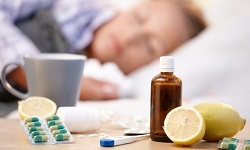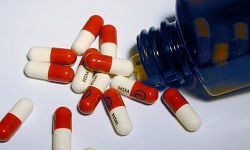From this article you will learn: what medications are used by the VSD, how effective they are.
The content of the article:
- What is VSD, and what drugs are needed to treat
- The first medication for a vegetovascular crisis.
- Nine groups of medicines for the continuous use of
VSD or vegetovascular dystonia is a symptom complex that combines various signs of disorders of the internal organs, in which standard pathological methods do not reveal any pathology.
The diagnosis of vegetovascular dystonia exists only in Russian medicine, it is not in Western countries, it is not included in ICD-10( international classification of diseases).
The absence of disease means no treatment. There is no "magic" drug that will help the patient with VSD.
Such people are forced to go to various specialists: therapists, cardiologists, endocrinologists, neuropathologists, but often do not find adequate help.
What is the VSD, and what drugs are needed to treat
At present( 2010s), a paradoxical situation has developed: some doctors( often the older generation) continue to exhibit a non-existent diagnosis and prescribe treatment, another part( usually young doctors) - do not noticecomplaints of patients and consider them "imaginary patients".Neither one nor the other approach helps a person with manifestations of vegetative dystonia.
The cause of this disorder is a violation of the nervous regulation of the internal organs. Their normal functioning is provided by the autonomic nervous system, which consists of sympathetic and parasympathetic parts. Dysfunction of any link leads to clinical manifestations.
 Click on photo to enlarge
Click on photo to enlarge In fact, vegeto-vascular dystonia is a neurosis caused by chronic stress, overfatigue, infections( especially viral), endocrinological disorders.
Note that VSD is the diagnosis of an exception. This means that the therapist or family doctor first conducts a thorough examination of all body systems. And only when no organic pathology is found, can be diagnosed with vegetovascular or neurocirculatory dystonia( this is the same thing).
Depending on the prevalence of changes in this or that part of the nervous system - from the brain to the peripheral nerves - complaints from patients are evident.
Symptoms typical for VSD in domestic medicine are combined into separate types.
Any type of vegetovascular dystonia is characterized by a sharp appearance of symptoms - a vegetative crisis that occurs paroxysmally. Attacks are often accompanied by a sense of fear, panic. In severe cases, panic attacks develop, a constant fear of death.
As we can see, the clinical picture of VSD is diverse, but the cause is neurotic. And he is treated by psychiatrists and psychotherapists. Drug treatment only supplements the psychological correction, quickly eliminating any manifestations, but without having a significant effect on the patient's recovery.
Drug treatment is divided into emergency - with a crisis, and a constant - with a therapeutic purpose.
First medication for vegetovascular attacks
If you develop a vascular crisis, you should quickly take action:
- keep nearby, in a designated place( so as not to waste time searching), a bottle of Valocordin or Corvalol, drink 20 drops of medicine - this will be a good remedyfrom the VSD in this case;
- with a sharp increase in blood pressure and heart beat, take 1 tablet of propranolol( Anaprilina) 40 mg;
- panic attack will help to overcome Diazepam( Relanium) - put 1 tablet under the tongue and slowly suck;
- with tachypnea( rapid breathing) take a paper bag and take a deep breath-exhale into it several times - this normalizes the respiration rate.
Knowledge of these methods of rapid care in case of vegetovascular crisis and the ability to use them contribute to the patient's confidence and calmness, thereby reducing the frequency and duration of autonomic seizures.

Nine groups of medicines for vegetative dystonia for continuous use of
The therapeutic effect is determined by the leading symptoms that are most troubling to the patient. The appointment of drugs for the treatment of VSD is always an additional method of therapy.
1. Sedative( sedative) remedies based on herbal raw materials
This group also has a weak hypnotic effect and anxiolytic( anti-anxiety).Preparations relieve increased tension, relax, balance the nervous system. These include:
- Novo-Passit,
- Persen,
- Negrustin.

2. Potassium and magnesium preparations
These are important microelements of the body, the deficit of which is often found in the inhabitants of megacities. Replenishment of their deficit relieves feelings of anxiety, irritability, increases efficiency and tolerance of physical exertion. Magnesium favorably affects nerve fibers, improves nerve conduction, and has a hypnotic effect. Especially shown magnesium and calcium in the respiratory type of VSD, as they prevent the sensation of a coma in the throat, asphyxiation.
Medications containing magnesium and potassium:
- Magne-B6 - magnesium in combination with vitamin B6;
- Magnelis;
- Asparks;
- Magneroth.

3. Nootropic drugs
These are drugs that have a psychotropic effect. The therapeutic effect is realized through an effect on the brain, which leads to the activation of higher brain functions. As a result of taking medicines of this group, the stability of the human body to unfavorable external factors increases, blood circulation is increased, metabolic processes in the vegetative system are activated. Nootropics improve memory and cognitive activity, increase the body's resistance to infections.
Representatives of the nootropic group:
- Nootropil;
- Fenotropil;
- Pyracetam;
- Phenibut.

4. Tranquilizers with anxiolytic effect( anxiolytics, small tranquilizers)
These drugs have a pronounced calming effect on the nervous system, hypnotic action, relax the muscles. Also, the drugs of this group relieve the feeling of fear, anxiety, reduce tearfulness. Because of the pronounced psychotropic effect, they are used only according to the prescription of the doctor and are released by prescription.
Among tranquilizers - as preparations with IRR are often used:
- Phenazepam;
- Diazepam;
- Valium.

5. Antidepressants
Antidepressants are expressed improve the mood and psychological state of the patient. The effect is realized due to the regulation of the exchange of neurotransmitters in an uneven system. Remove panic attacks with prolonged use.
These include:
- Prozac;
- Maprotiline;
- Zyban.

6. Vitamin and mineral complexes
These drugs fill the deficiency of microelements and vitamins, increase resistance to infections, increase immunity. Complex preparations stimulate physical and mental activity.
Among them:
- Supradin;
- Pictovit;
- Complisite.

7. Group B vitamins
These vitamins favorably influence neuromuscular conduction, have an anti-anxiety and weak hypnotic effect. Drugs of this group: Pentavit, Neuromultivitis.
8. Adaptogens
Adaptogens are substances of vegetable origin, have a general strengthening and tonic effect, increase immunity, improve mood. Can be combined with vitamins and trace elements. Drugs slightly increase blood pressure, therefore, are not recommended for patients with initially high blood pressure.
Often used in practice:
- Antistress formula;
- Doppelherz Ginseng;
- Pantocrine.

The drugs described above can be administered with different types of SBH, depending on the individual reaction of the organism.
9. Other medicines
Some forms of VSD use specific medications that affect the leading sign of pathology.
- In the hypertensive type, an additional antihypertensive drug is indicated. The best choice for VSD are beta-blockers: Enalapril, Atenolol, Metopronalol.
- With cardiac type, pain in the heart area is effectively removed Corvalol, Validol, Valocordin.
- In visceral and cystalgic - a positive effect can have antispasmodics: No-shpa, Baralgin.
- With isolated visceral, preparations that reduce gas formation and strengthened intestinal motility are also shown: Espumizan, Motilium.
- Tachycardia type in rare cases may require the appointment of antiarrhythmic drugs: Ritmonorm, Allapinin.

Drugs in the VSD refer to different pharmacological groups and are assigned individually to each patient. There are no universal prescriptions for this pathology.



